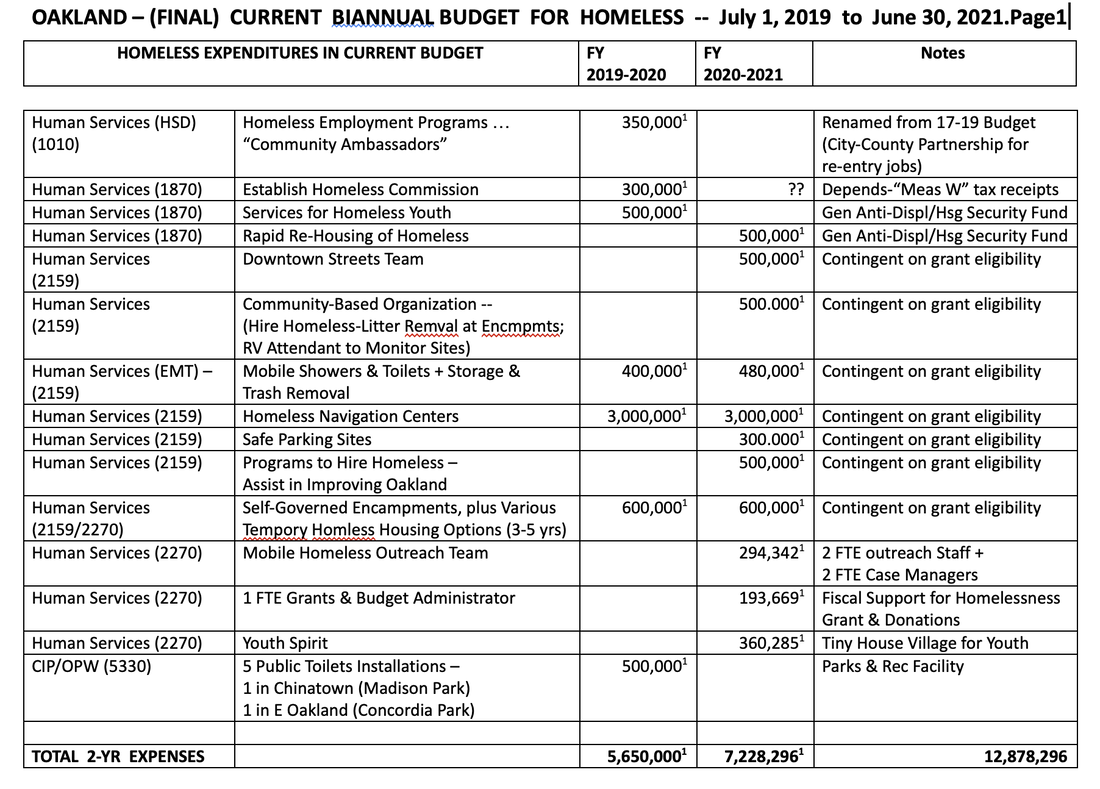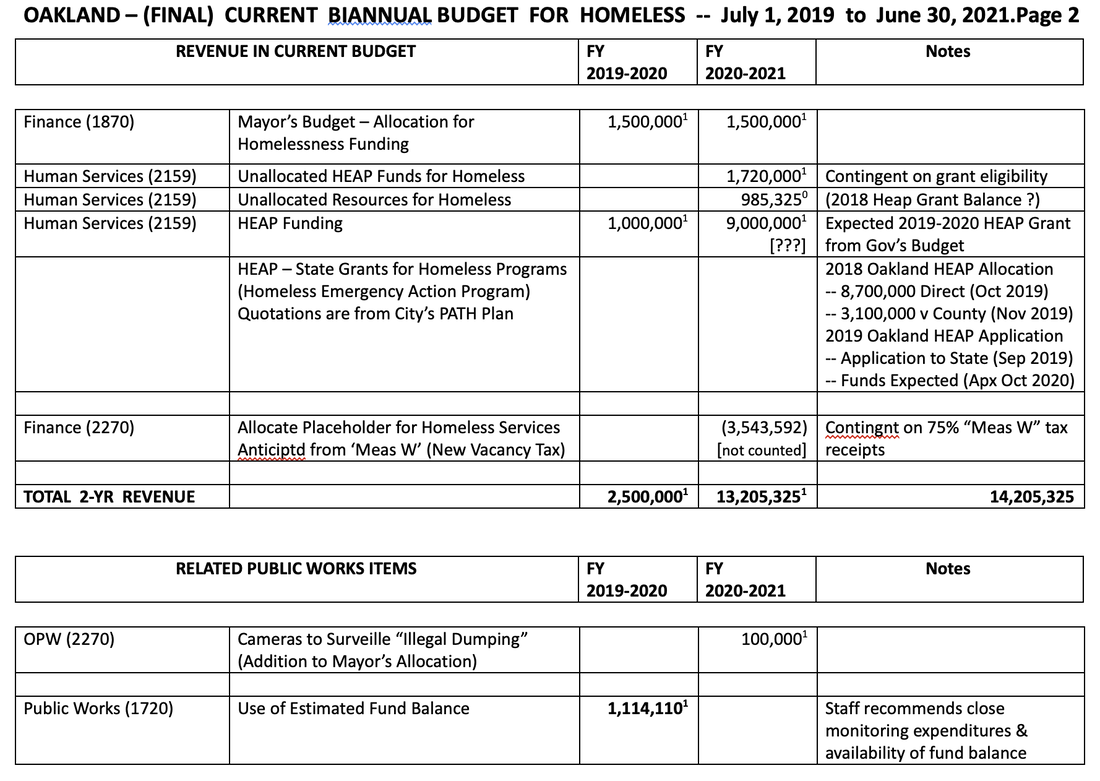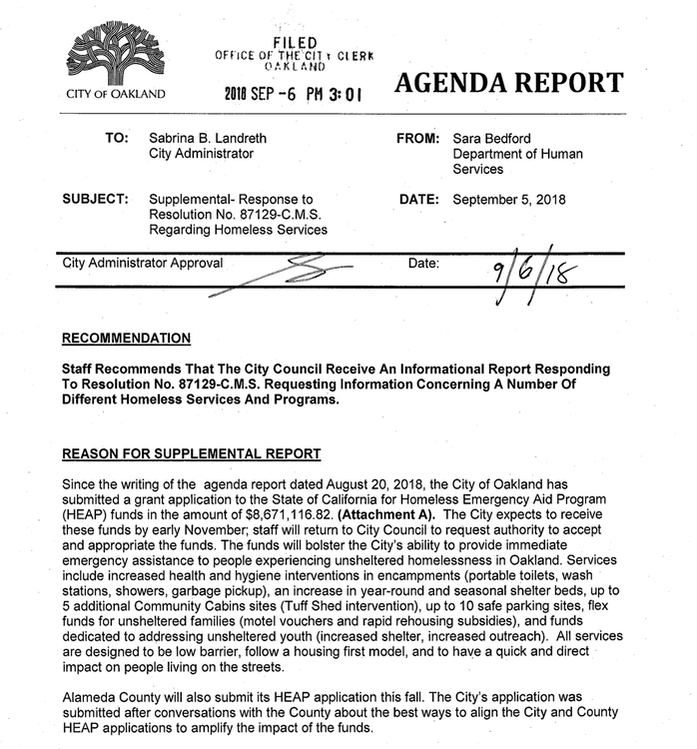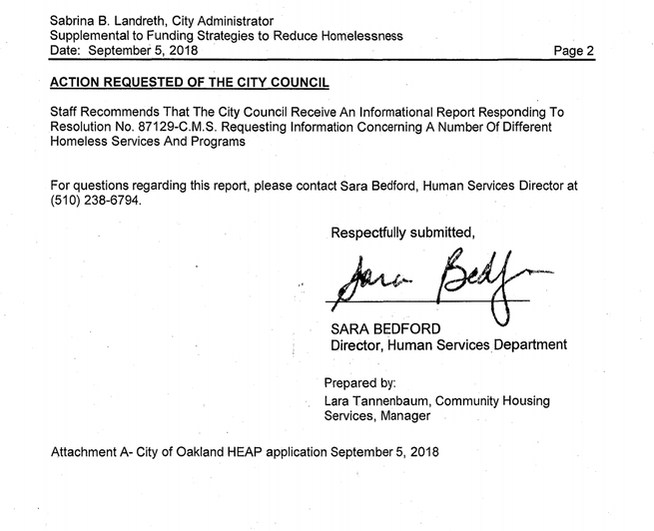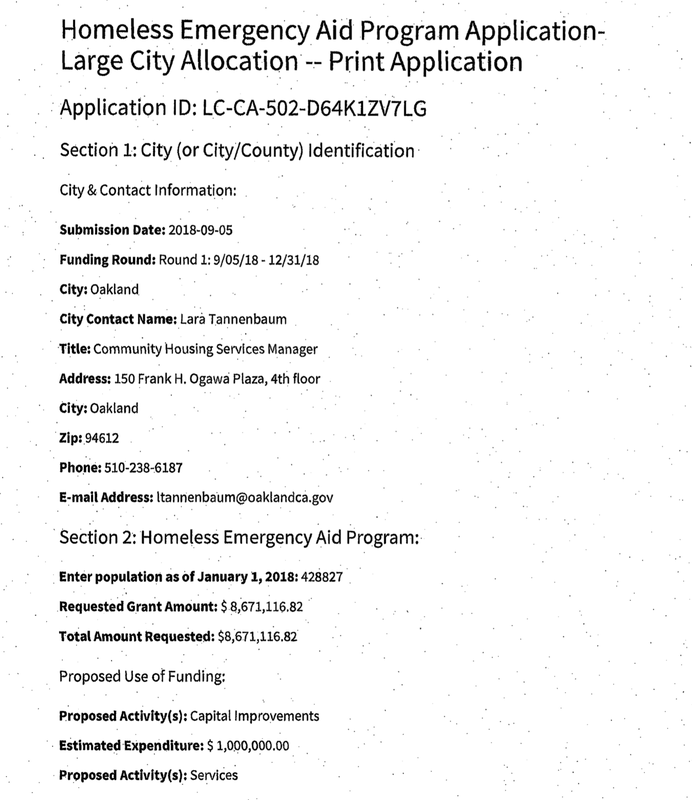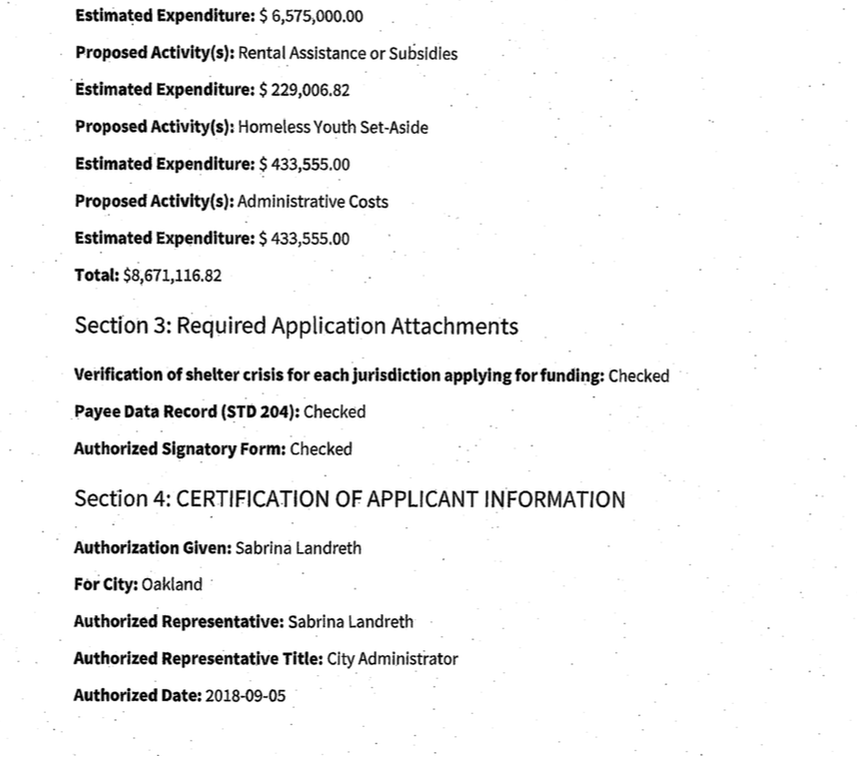Oakland Proposed Policy Budget 2021-2023 link
Proposal for County of Alameda and City Of Oakland to Use Three (3) Alameda County RFP Properties for Essential Homeless Needs --
The 2019 Point-In-Time count verifies that the homelessness problem in Alameda County grew by at least 43%, and in Oakland by at least 47% over the 2017 count. The fact that homelessness is a fast-growing county-wide epidemic is not debatable. The destructive epidemic directly affects the lives of the many who are displaced onto the streets, threatens the public health of all residents as well as those displaced, and diminishes the environment and quality of life of people, neighborhoods, and communities throughout Alameda County.
Oakland accounts for over 50% of the County’s homeless population, with at least 90 impromptu encampments and over 4000 unhoused residents throughout the city, making Oakland “ground zero” for desperate need requiring urgent and immediate action. Recently, the Board of Supervisors identified three (3) county properties for possible disposition:
(1) The abandoned former Social Services Headquarters at 401 Broadway (potentially for RFP);
(2) The abandoned Parole Department at 400 Broadway & 495 5th Street (potentially for RFP); and associated miscellaneous buildings.
(3) The Glen Dyer Jail at 550 7th St (recently offered for $1 lease to the City of Oakland).
We, a group of homeless advocates, strongly urge the county to recall any current RFPs for these properties, and to dedicate the two Broadway properties and related buildings, in partnership with Oakland—or for interim $1 leases to the City of Oakland—specifically for anti-homelessness uses, including dedicating the proceeds from the sale of the jail property to fund such uses. Recommended Actions:
- Retrofit 401 Broadway as an SRO-type residential facility. Co-management models may be employed to reduce the costs of administration and management.
- Retrofit 430 Broadway to house families with children, seniors, unaccompanied minors, persons with disabilities, and youth transitioning from foster homes. These populations are underserved by present city or county homelessness programs.
- At both the 401 Broadway & the 400 Broadway properties, provide “Service Center” provisions, including personal storage, lockers, laundry facilities, showers and sanitation. Other services might include counseling & evaluation; employment & skills training, and navigation assistance.
- Sell the Glen Dyer Jail and earmark proceeds of the sale for the production of permanent housing for the homeless. Annually, increase the Homelessness Fund by substantial cash allocations for direct subsidies to assist unsheltered and at-risk households to both obtain and to maintain permanent housing.
- Deploy best practices, model and test innovative programs and methods, and monitor and measure operations for effectiveness and replication.
- Create a citizen engagement task force to establish effective communications and neighborhood and community partnerships together with homeless populations and advocacy organizations.
Your combined positive action is urgently needed and your joint response is immensely appreciated. We stand fully committed to beneficial solutions for homelessness and can be called upon for assistance or additional information as may be needed.
Sincerely, The members of: The Homeless Advocacy Working Group (HAWG) • www.ShelterOak.org/HAWG; ShelterOak Advocates • www.ShelterOak.org; East Oakland Collective (EOC) • www.eastoaklandcollective.com ; The Village / Feed the People • https://thevillageinoakland.org
____________________________________________________________________________________________________
Additional ENDORSEMENTS
Just Cities/The Dellums Institute for Social Justice • http://dellumsinstitute.org/ ; Brotherhood of Elders Network • http://brotherhoodofelders.net/;
The David R. Brower, Ronald V. Dellums Institute for Sustainable Policy Studies and Action (ISPS/A) • https://www.browerdellumsinstitute.org/ ;
U-Inspire • https://u-inspire.org/ ; 600+ signatories of the change.org petition
Summary of Select Clauses of Council Member Nikki Bas' 20 June Followup
Homelessness EMT Report & Action Proposals
(approved 9 July 2019 by City Council) -- that are particularly relevant to HAWG.
A. Councilmember Bas and the City Administrator agreed to the following over the short-term:
1. Hold a series of meetings over the summer between Councilmember Bas’ office and key partners from the EMT, including The Human Services Department (HSD), Public Works (OPW), Police Department (OPD), Operation Dignity, and others to further discuss the Encampment Management Team’s operations and the Councilmember’s recommendations.
2. Members of the EMT and/or City Administrator will join meetings of the Homeless Advocacy Working Group (HAWG) to discuss increased communication, operations and procedures regarding the City’s Encampment Management Program.
3. Implement a number of recommendations in the short-term, described below.
B. Councilmember Bas and the City Auditor’s Office agreed to the following:
1. Explore the scope, cost, and timeline for a full performance audit of the City’s homeless Encampment Management Program.
The following are potential audit topics:
• Cost of the Encampment Management Program
• Determine how many encampments actually exist in the City of Oakland
• Assess the quality of conditions at encampments
• Achieving goals and objectives
• Response time for 911, 311, and 211 calls
• Service data - How many served in encampments; the number that received permanent housing; the retention rates on permanent housing
• Assessment of the "bag and tag" process
• Closure notification process
• Best practices
• Quality of data around the encampment program
2. Coordination and partnerships with City departments and other governmental agencies
3. The City Auditor’s Office anticipates issuing a contract to complete this audit. The estimated cost of the audit is between $80,0000 to 100,000,
and once awarded, the audit should take 6 months to complete.
C. Councilmember Bas discussed with Joe DeVries of the City Administrator’s Office and Encampment Management Team:
1. Potential next-steps related to the previous supplemental.
2. Topics included stronger communication among stakeholders.
3. Short-term procedural changes to the Encampment Management Program.
D. Oakland’s housing affordability and homelessness crisis is a top priority of the City's residents, as informed by the City’s recent budget survey.
1. the City's goal should be housing our residents.
2. And while people are living on our curbs, our focus should be public health and safety — the health and safety of unsheltered individuals and families, and surrounding communities;
3. And addressing sanitation, trash, and illegal dumping.
General Encampment Management Policies and Procedures
AA. Encampment Management and Closures
1. Notices at encampments will be posted in other languages, including Spanish, Chinese, and Vietnamese in addition to English.
2. Notices of closures and the posting of warning notices are possible in most cases, except where there is an immediate safety hazard. The city agrees with the general principle of providing encampments with specific issues to be corrected and giving advance notice prior to closure. This information would also be communicated during future meetings with the Homeless Advocacy Working Group (HAWG).
3. The city will explore having Operation Dignity provide transportation, bags, gloves, water, and other necessities during the move of encampment closures, but cited that additional resources may be needed.
4. The city will explore providing storage space for unsheltered residents, but cited additional resources are needed including staff, funds, and actual space.
BB Providing Basic Services to the Unsheltered
1. If additional resources are allocated in the new budget, the City will provide services to additional encampments. Through meetings described above, the EMT will develop a proposal with stakeholders for serving additional encampments.
2. The City Administrator’s Office was encouraging of the idea of exploring partnerships to provide services and materials, such as fire extinguishers. This is an area that neighbors, volunteers, Councilmember offices and others can explore.
CC. Self-Governance and Sanctioned Encampments
1. The City Administrator’s Office and Councilmember Bas agreed to work on defining what a self-governed and sanctioned encampment is, with involvement from unsheltered residents and advocates. This would inform the development of a pilot program if/when funds are available in the new budget for such sites.
DD. Employment Opportunities for the Unsheltered
1. If/when funds are approved in the new budget, the City will develop employment opportunities for unsheltered residents, with input through the meetings described above.
EE. Transparency and Accountability
1. The City will make public and available the City’s master list of encampments.
2. The City will ensure that the list of encampment closures online is accurate and representative, as well as the list of enforcement efforts taking place at previous encampment sites.
a. The City will explore posting notices in public locations such as the City Hall bulletin board and Main Library.
b. Notices shall be provided 30 days in advance for closures except when urgent Health and Safety conditions require a faster response and in instances where the City is enforcing a previously closed area that has become re-encamped.
c. Notices shall be provided two weeks in advance for clean and clears except when urgent Health and Safety conditions require a faster response.
3. During closure enforcements, the City will ensure unhoused residents are provided with adequate housing and service options via service providers when resources allow and via fliers-with-information, including-the 211 Hotline, Henry-Robinson Multi-Service Center, St VinGent-de-Paul, and other shelter options.
FF. Other Recommendations
1. Several recommendations in the prior supplemental are not included above for short-term follow up because there either was not agreement between Councilmember Bas’s office and the City Administrator’s Office, or because they require a longer timeline and additional resources.
2. These items could be explored further if/when a high-level official on homelessness and a Homeless Advisory Commission are on board.
3. The full list of recommendations from the last supplemental report would be shared with the new official, and with the Commission
GG. Councilmember Bas shall schedule a report on progress at the Life Enrichment Committee to be heard no later than 3 December 2019 on Agreements and next steps discussed in the meetings between Councilmember Bas’ office and the City Administrator’s Office.
Homelessness EMT Report & Action Proposals
(approved 9 July 2019 by City Council) -- that are particularly relevant to HAWG.
A. Councilmember Bas and the City Administrator agreed to the following over the short-term:
1. Hold a series of meetings over the summer between Councilmember Bas’ office and key partners from the EMT, including The Human Services Department (HSD), Public Works (OPW), Police Department (OPD), Operation Dignity, and others to further discuss the Encampment Management Team’s operations and the Councilmember’s recommendations.
2. Members of the EMT and/or City Administrator will join meetings of the Homeless Advocacy Working Group (HAWG) to discuss increased communication, operations and procedures regarding the City’s Encampment Management Program.
3. Implement a number of recommendations in the short-term, described below.
B. Councilmember Bas and the City Auditor’s Office agreed to the following:
1. Explore the scope, cost, and timeline for a full performance audit of the City’s homeless Encampment Management Program.
The following are potential audit topics:
• Cost of the Encampment Management Program
• Determine how many encampments actually exist in the City of Oakland
• Assess the quality of conditions at encampments
• Achieving goals and objectives
• Response time for 911, 311, and 211 calls
• Service data - How many served in encampments; the number that received permanent housing; the retention rates on permanent housing
• Assessment of the "bag and tag" process
• Closure notification process
• Best practices
• Quality of data around the encampment program
2. Coordination and partnerships with City departments and other governmental agencies
3. The City Auditor’s Office anticipates issuing a contract to complete this audit. The estimated cost of the audit is between $80,0000 to 100,000,
and once awarded, the audit should take 6 months to complete.
C. Councilmember Bas discussed with Joe DeVries of the City Administrator’s Office and Encampment Management Team:
1. Potential next-steps related to the previous supplemental.
2. Topics included stronger communication among stakeholders.
3. Short-term procedural changes to the Encampment Management Program.
D. Oakland’s housing affordability and homelessness crisis is a top priority of the City's residents, as informed by the City’s recent budget survey.
1. the City's goal should be housing our residents.
2. And while people are living on our curbs, our focus should be public health and safety — the health and safety of unsheltered individuals and families, and surrounding communities;
3. And addressing sanitation, trash, and illegal dumping.
General Encampment Management Policies and Procedures
AA. Encampment Management and Closures
1. Notices at encampments will be posted in other languages, including Spanish, Chinese, and Vietnamese in addition to English.
2. Notices of closures and the posting of warning notices are possible in most cases, except where there is an immediate safety hazard. The city agrees with the general principle of providing encampments with specific issues to be corrected and giving advance notice prior to closure. This information would also be communicated during future meetings with the Homeless Advocacy Working Group (HAWG).
3. The city will explore having Operation Dignity provide transportation, bags, gloves, water, and other necessities during the move of encampment closures, but cited that additional resources may be needed.
4. The city will explore providing storage space for unsheltered residents, but cited additional resources are needed including staff, funds, and actual space.
BB Providing Basic Services to the Unsheltered
1. If additional resources are allocated in the new budget, the City will provide services to additional encampments. Through meetings described above, the EMT will develop a proposal with stakeholders for serving additional encampments.
2. The City Administrator’s Office was encouraging of the idea of exploring partnerships to provide services and materials, such as fire extinguishers. This is an area that neighbors, volunteers, Councilmember offices and others can explore.
CC. Self-Governance and Sanctioned Encampments
1. The City Administrator’s Office and Councilmember Bas agreed to work on defining what a self-governed and sanctioned encampment is, with involvement from unsheltered residents and advocates. This would inform the development of a pilot program if/when funds are available in the new budget for such sites.
DD. Employment Opportunities for the Unsheltered
1. If/when funds are approved in the new budget, the City will develop employment opportunities for unsheltered residents, with input through the meetings described above.
EE. Transparency and Accountability
1. The City will make public and available the City’s master list of encampments.
2. The City will ensure that the list of encampment closures online is accurate and representative, as well as the list of enforcement efforts taking place at previous encampment sites.
a. The City will explore posting notices in public locations such as the City Hall bulletin board and Main Library.
b. Notices shall be provided 30 days in advance for closures except when urgent Health and Safety conditions require a faster response and in instances where the City is enforcing a previously closed area that has become re-encamped.
c. Notices shall be provided two weeks in advance for clean and clears except when urgent Health and Safety conditions require a faster response.
3. During closure enforcements, the City will ensure unhoused residents are provided with adequate housing and service options via service providers when resources allow and via fliers-with-information, including-the 211 Hotline, Henry-Robinson Multi-Service Center, St VinGent-de-Paul, and other shelter options.
FF. Other Recommendations
1. Several recommendations in the prior supplemental are not included above for short-term follow up because there either was not agreement between Councilmember Bas’s office and the City Administrator’s Office, or because they require a longer timeline and additional resources.
2. These items could be explored further if/when a high-level official on homelessness and a Homeless Advisory Commission are on board.
3. The full list of recommendations from the last supplemental report would be shared with the new official, and with the Commission
GG. Councilmember Bas shall schedule a report on progress at the Life Enrichment Committee to be heard no later than 3 December 2019 on Agreements and next steps discussed in the meetings between Councilmember Bas’ office and the City Administrator’s Office.
Update from City of Oakland , December 18, 2018
Oakland City Council Approves $8.6 million Emergency Funding
The State of California recently awarded the City of Oakland an unprecedented $8.6 million in funding through the Homeless Emergency Aid Program (HEAP). A group of bi-partisan mayors from the state’s largest 11 cities successfully lobbied to add the resources into the State budget, and Oakland was the first city in California to apply.
On Tuesday, October 30, the Oakland City Council passed a resolution that authorizes the City Administrator to use $6.6 million of the $8.6 million in HEAP funds to do the following:
Continuum of Interventions to Address Homeless Crisis
The City of Oakland has been investing in a wide variety of critical efforts to house individuals. Since the crisis has escalated over the past two years, the City:
In the past decade, the Bay Area added one unit of housing for every eight jobs created, and very little of the housing built was subsidized enough to help people in need. While the homeless population is rising, the federal government decreased its financial support for emergency shelter strategies, and the State eliminated redevelopment funding in 2011, which was the primary funding source cities used to build affordable housing.
California alone accounts for 25 percent of the nation’s homeless population. Between 2015 and 2017, the number of unsheltered residents in Oakland increased by 26 percent.
The last point-in-time count, conducted in January 2017, estimated that there are 2,761 homeless people in Oakland, of whom 1,902 are unsheltered. Details and demographic information can be found at EveryOne Home. [HAWG estimates that the number of street homeless was appx 6000 persons in 2018.]
Oakland City Council Approves $8.6 million Emergency Funding
The State of California recently awarded the City of Oakland an unprecedented $8.6 million in funding through the Homeless Emergency Aid Program (HEAP). A group of bi-partisan mayors from the state’s largest 11 cities successfully lobbied to add the resources into the State budget, and Oakland was the first city in California to apply.
On Tuesday, October 30, the Oakland City Council passed a resolution that authorizes the City Administrator to use $6.6 million of the $8.6 million in HEAP funds to do the following:
- Open three new Community Cabin sites (Tuff Shed shelters), providing emergency shelter and services to up to 320 people per year, putting them on a path to transitional and permanent housing. This will:
- Reduce the number of people currently living in dangerous, unregulated street encampments in West, Central, and East Oakland.
- Eliminate the health and safety impacts those encampments are having on the surrounding community.
- Allow the City to relocate unsheltered residents currently living in the encampment located at East 12thStreet & 23rd Avenue that will be displaced by the 23rdAvenue Bridge Retrofit Project, as well as the encampments at 25th & Peralta streets, Wood Street, and Hollis & MacArthur in West Oakland, and various smaller encampments in the Jack London Square and Chinatown areas.
- 3050 International Blvd (City property) [Changed at Dec 11 Council meeting to Miller Library parcel at 1449 Miller] —will serve the unsheltered community living at East 12th & 23rdAvenue, which needs to be vacated by the end of the year to make way for the 23rd Ave Bridge Retrofit project.
- 3401 Mandela Parkway (Caltrans property large enough to accommodate two Community Cabin sites)—will offer shelter to those living under the 580 freeway at 35th & Peralta, as well as people living in a large encampment on the 2400 to 2600 block of Wood Street. As people transition through this site into housing, additional encampments in the area can also be addressed, including behind Home Depot, the 2800 block of Ettie Street, the 2400-2600 block of Union Street, and others; and
- 105 - 5th Street (Caltrans parcel located under 880 from Oak to Madison streets)—will serve the unsheltered from several smaller encampments in the Jack London Square and Chinatown areas. This site could be developed as a replacement to the Castro site, which will be closing in March 2019, as previously planned.
- Open four managed recreational vehicle (RV) sites in East, Central, and West Oakland that will provide up to 150 RVs (an estimated 300 persons) with secure parking, sanitary facilities, and garbage services. This will also reduce the impact of RVs parking in Oakland neighborhoods without sanitary services. Staff has identified three viable locations for these sites: 1) 3499 Beach Street, connected to 3401 Mandela where a double Community Cabin site is proposed; 2) 711 71stAvenue across from Coliseum BART; 3) 3801 East 8thStreet near High Street and I-880; 4) Parking lot located at 11 4th Street; this site would offer wrap-around series and would be a sort of hybrid between the Community Cabins sites and the managed RV sites.
- Allow the City to enter into an agreement with the Lao Family Foundation to manage a volunteer encampment in partnership with “The Village”located at 1449 Miller Avenue, the former site of the Miller Avenue Library, to provide a safe location for their participants who will be displaced by the 23rdAvenue Bridge Retrofit Project. This would include providing sanitary and garbage service to the site.
- Contract with service providers to increase the number of year-round shelter beds from 350 to 450, and operate the winter shelter year-round.
- Authorize an $800,000 grant agreement with BACS to provide day-to-day management of the interim housing program for unsheltered residents at The Holland, the new rapid rehousing facility at 641 Grand Ave.
Continuum of Interventions to Address Homeless Crisis
The City of Oakland has been investing in a wide variety of critical efforts to house individuals. Since the crisis has escalated over the past two years, the City:
- Launched the Community Cabin Program (aka Tuff Shed Program). This model has been an effective and compassionate intervention focused on increasing people’s health, stability, dignity, and safety, while service providers intensively work with people to help end their unsheltered status. With a 63% success rate to date, the Community Cabins are an emergency intervention designed to serve as a temporary bridge from the sidewalk to services, from the street to housing.
- Worked to create more transitional and permanent affordable housing, including for very low-income residents, funded by Measure KK (City of Oakland) and Measure A1 (Alameda County).
- Formed an interdepartmental Encampment Management Team that responds to homelessness.
- Implemented a more coordinated approach to providing services to unsheltered residents that prioritizes those most in need and increased the numbers of outreach workers and housing navigators working directly with people on the streets.
- Expanded number of winter shelter beds and extended it year-round [at one 100-bed location] only].
- Expanded housing navigation and street outreach.
- Secured large youth rapid re-housing grant.
- Invested in anti-displacement, rent arbitration, eviction prevention, and critical prevention efforts.
- Offered financial incentives for Oakland-based landlords to rent to Section 8 voucher holders.
- Mayor Libby Schaaf joined a 14-city group, “Mayors and CEOs for U.S. Housing Investment” that aligns business partners with local governments to seek federal money for affordable housing and homeless services.
- Mayor Schaaf is also part of the Big 11 Mayors in California which is advocating for direct allocations to their cities of state HEAP (Homeless Emergency Aid Program) funds. Oakland is receiving $8.6 million to address unsheltered homelessness.
In the past decade, the Bay Area added one unit of housing for every eight jobs created, and very little of the housing built was subsidized enough to help people in need. While the homeless population is rising, the federal government decreased its financial support for emergency shelter strategies, and the State eliminated redevelopment funding in 2011, which was the primary funding source cities used to build affordable housing.
California alone accounts for 25 percent of the nation’s homeless population. Between 2015 and 2017, the number of unsheltered residents in Oakland increased by 26 percent.
The last point-in-time count, conducted in January 2017, estimated that there are 2,761 homeless people in Oakland, of whom 1,902 are unsheltered. Details and demographic information can be found at EveryOne Home. [HAWG estimates that the number of street homeless was appx 6000 persons in 2018.]
Residential Property Acquisitions
October 2018 update
City Officials Unveil “The Holland” Rapid Re-Housing Facility
The City of Oakland is now the official owner of 641 Grand Avenue, a three-story Arts and Crafts style residential hotel historically called Hotel Holland, designed by famed local architect Julia Morgan and built in 1906. Last night the Oakland City Council approved $800,000 to fund Bay Area Community Services (BACS) to manage on-site services for new residents.
“This facility is one more way that we are inviting people out of the cold, off the streets, and into safety and services,” said Mayor Schaaf. “It is thrilling to be opening a second location of our very successful Henry Robinson Rapid Rehousing Program. Up to 180 formerly unsheltered residents a year will get shelter, services, care, and support on their path to self-sufficiency in this beautiful, historic Julia Morgan building.”
Mayor Schaaf also praised the Council for taking bold moves to respond to the homeless crisis, and acknowledged Councilmember Abel Guillen, District 2, as a champion for acting with urgency to provide basic shelter to our unsheltered residents.
Councilmember Guillen said, “This is truly a milestone in improving the state of our unhoused residents. Because of the generosity of Oakland taxpayers who passed Measure KK in 2016, we put $7 million to buy this building, and allocated another $8 million to complete similar housing projects. We know that this model works in ending homelessness, and we want to continue replicating it to care for more of our fellow residents who are otherwise forced to live on the streets, in our parks, or in their vehicles.”
Innovative and Successful: Henry Robinson Rapid Rehousing Model
Funded by Measure KK, “The Holland” building will serve as a multi-service facility modeled after Oakland’s successful Henry Robinson Center (also managed by BACS) which serves 300 recently homeless people per year and has an 88 percent success rate of placing clients into permanent housing when they exit.
Homeless, single adults, aged 18 and older, are eligible for the program. With 70 units, the facility can assist about 90 individuals at a time, or between 150 and 180 residents per year. The new facility will open and welcome residents in December. With the Winter Shelter transitioning to become a year-round shelter and the Community Cabin site at 6th and Castro closing, The Holland will serve as a vital pathway to get people into housing.
The innovative Henry Robinson Rapid Rehousing model was developed about four years ago to address the growing number of unsheltered, single individuals living on the streets. This approach provides transitional housing for short stays of about 4-6 months. Program staff work to stabilize people; help them get document-ready for permanent housing; connect them to a medical care home, mental health services, and substance abuse treatment; and then focus on placing clients in permanent housing. After people are placed, they are provided ongoing support to keep them housed, including funds to assist with furniture, security deposits, and small subsidies if necessary to ensure their success. To date, 88% of the people who complete the program, who came from the street, end up in permanent housing—a phenomenal success rate. This program is a critical component to end homelessness in Oakland.
The Housing & Community Development Department oversaw the acquisition and rehabilitation of the building, while the Human Services Department will manage the contract with BACS overseeing the day-to-day management.
City Officials Unveil “The Holland” Rapid Re-Housing Facility
The City of Oakland is now the official owner of 641 Grand Avenue, a three-story Arts and Crafts style residential hotel historically called Hotel Holland, designed by famed local architect Julia Morgan and built in 1906. Last night the Oakland City Council approved $800,000 to fund Bay Area Community Services (BACS) to manage on-site services for new residents.
“This facility is one more way that we are inviting people out of the cold, off the streets, and into safety and services,” said Mayor Schaaf. “It is thrilling to be opening a second location of our very successful Henry Robinson Rapid Rehousing Program. Up to 180 formerly unsheltered residents a year will get shelter, services, care, and support on their path to self-sufficiency in this beautiful, historic Julia Morgan building.”
Mayor Schaaf also praised the Council for taking bold moves to respond to the homeless crisis, and acknowledged Councilmember Abel Guillen, District 2, as a champion for acting with urgency to provide basic shelter to our unsheltered residents.
Councilmember Guillen said, “This is truly a milestone in improving the state of our unhoused residents. Because of the generosity of Oakland taxpayers who passed Measure KK in 2016, we put $7 million to buy this building, and allocated another $8 million to complete similar housing projects. We know that this model works in ending homelessness, and we want to continue replicating it to care for more of our fellow residents who are otherwise forced to live on the streets, in our parks, or in their vehicles.”
Innovative and Successful: Henry Robinson Rapid Rehousing Model
Funded by Measure KK, “The Holland” building will serve as a multi-service facility modeled after Oakland’s successful Henry Robinson Center (also managed by BACS) which serves 300 recently homeless people per year and has an 88 percent success rate of placing clients into permanent housing when they exit.
Homeless, single adults, aged 18 and older, are eligible for the program. With 70 units, the facility can assist about 90 individuals at a time, or between 150 and 180 residents per year. The new facility will open and welcome residents in December. With the Winter Shelter transitioning to become a year-round shelter and the Community Cabin site at 6th and Castro closing, The Holland will serve as a vital pathway to get people into housing.
The innovative Henry Robinson Rapid Rehousing model was developed about four years ago to address the growing number of unsheltered, single individuals living on the streets. This approach provides transitional housing for short stays of about 4-6 months. Program staff work to stabilize people; help them get document-ready for permanent housing; connect them to a medical care home, mental health services, and substance abuse treatment; and then focus on placing clients in permanent housing. After people are placed, they are provided ongoing support to keep them housed, including funds to assist with furniture, security deposits, and small subsidies if necessary to ensure their success. To date, 88% of the people who complete the program, who came from the street, end up in permanent housing—a phenomenal success rate. This program is a critical component to end homelessness in Oakland.
The Housing & Community Development Department oversaw the acquisition and rehabilitation of the building, while the Human Services Department will manage the contract with BACS overseeing the day-to-day management.
Homeless Emergency Aid Program HEAP
"Adoption of the proposed resolution will authorize the City Administrator to reallocate Alameda County Immediate Impact grant funds and City General Purpose Safe Haven funds to expand the City’s Community Cabins sites. The proposed resolution would also allow the City Administrator to enter into an agreement with Housing Consortium of the East Bay (HCEB) to provide a Community Cabin program at an additional site and authorizes an amendment to the grant agreement with HCEB to increase the amount if additional funding becomes available." PDF resolution report below
| view_report.pdf | |
| File Size: | 4836 kb |
| File Type: | |

